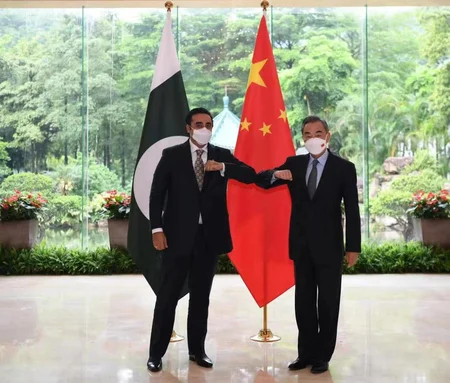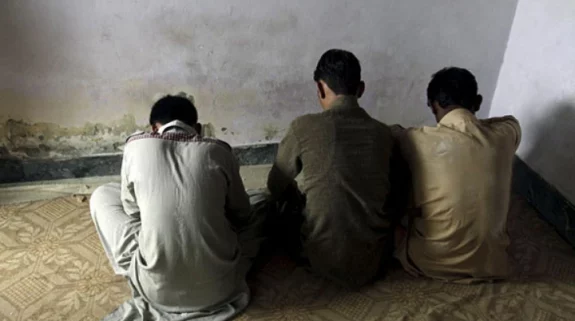Beijing has been building pressure on a reluctant Islamabad to allow China’s security agencies to enter Pakistan to provide security to Chinese citizens working in various CPEC infrastructure projects in the country.
Last month, following the suicide attack on its citizens in Karachi, the Chinese government had told the Shehbaz Sharif government that it had decided to set up a nodal Chinese security agency in Pakistan under the Chinese Ministry of State Security but Pakistan’s Interior Minister Rana Sanaullah turned down the “proposal.
The minister had asserted that as a sovereign country Pakistan cannot allow any other country to bring in its security agency.
The Chinese authorities have conveyed their concern on the issue to Pakistani army chief General Qamar Javed Bajwa and Foreign Minister Bilawal Zardari Bhutto during their recent trips to Beijing.
Nikkie Asia reported that once again Bajwa and Bilawal were reminded about the need for Chinese security agencies in Pakistan. “The two sides put out a statement saying that "China appreciated Pakistan's commitment to the safety and security of Chinese nationals" and that they would "further enhance counter-terrorism and security cooperation," according to Beijing's Foreign Ministry.
According to Pakistani experts, “to further enhance counter-terrorism and security cooperation” means that the Chinese are not satisfied with the security provided by the Pakistani agencies and want to take matters in their hands.
Quoting Pakistani sources, Nikkie Asia reported that “Beijing has sought to bring in its own security since 10 Chinese people were killed last year in an attack on a bus in the northern city of Dasu. The attack on Chinese instructors at the Confucius Institute in Karachi this year further pushed the Chinese to ask Pakistan to allow operations of Chinese security agencies.”
Sources also said that the Chinese when they gave Pakistan $2.3 billion from a consortium of Chinese lenders to help it top up its dwindling foreign reserves.
After a daring suicide attack on a van carrying Chinese teachers in Karachi in April, which left three Chinese nationals dead, China became worried about the militant’s new strategy to adopt "fidayeen" tactics.
The deployment of a woman suicide bomber, the BLA attack on the university premises has added an altogether new dimension.
Also Read: After suicide bombing, China warns Pakistan—eliminate root causes to save CPEC
Following the attack a delegation led by Cheng Guoping, China's External Security Commissioner, visited Islamabad and requested the Prime Minister Shehbaz Sharif to provide better security arrangements to their citizens who have been engaged in the CPEC and other projects.
Sharif promised that Pakistan security agencies will set up a foreign security cell at the Central Police Office (CPO) with the requisite staff and logistics. As per the report, the Special Branch, Counter-Terrorism Department (CTD) and Security Division were assigned to audit the security arrangements periodically. Sharif also apprised the delegation that Pakistan Army is in full controlcontrol of the CPEC in a bid to reassure Beijing that their investments will be more secure amid terrorist attacks on Chinese engineers and others facilitating infrastructure projects. The Pakistan Army has raised a special security division just to look after CPEC projects and Chinese workers.
But according to sources, Chinese were not satisfied with the “arrangements” made by the Pakistani securities.
"Chinese interests have been under attack by Baloch insurgents in the south and Pakistani Taliban in the north, and this has naturally led to lack of confidence in Pakistani security. The pattern of attacks are recurring and it's clear that Pakistani promises of 'foolproof security' are mere words, not matched by countermeasures on the ground,” says the report by Nikkie Asia.
According to Pakistani analysts, China has more than 5,000 private security agencies, 20 of which operate internationally and there are thousands of Chinese engineers and workers who are working in Pakistan. The Chinese security agencies are already active in Central Asia and Africa and China wants the same in Pakistan but the Pakistani government has told China that the presence of Chinese agencies would increase resentment against China especially in Balochistan, where anti-Chinese sentiment is already very strong.
Beijing is becoming increasingly frustrated that Pakistan is failing to curb terrorism. It must be noted that although the Baloch's are struggling for a national independence movement, many of the terrorists responsible for attacks, particularly among the Pashtun, are groups with deep links and ties with Pakistan's Inter-Services Intelligence (ISI) and have a Salafi ideology.
According to Pakistani watchers, Beijing is also putting pressure on Pakistan on the ongoing peace talks with the Tehreek-e-Taliban Pakistan (TTP) as it was important that Pakistan “accommodates” some of the TTP’s demands and end the group’s war on the China-Pakistan Economic Corridor.
Also Read: Killing of Chinese nationals, mounting CPEC debt widens rift between Beijing and Islamabad




















